|
|
|
Sort Order |
|
|
|
Items / Page
|
|
|
|
|
|
|
| Srl | Item |
| 1 |
ID:
153260
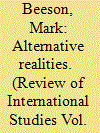

|
|
|
|
|
| Summary/Abstract |
The central argument of this article is that constructivists in particular underestimate or even ignore the importance of the ‘real’ structural inheritance that shapes state (and the political elites that represent them) behaviour. Even though the future is indeterminate, some outcomes are decidedly more likely than others, especially where policymakers believe they inhabit a strategic universe of zero sum outcomes and where self-reliance and assertion remain important. I suggest that ‘critical realism’ offers a way of accounting for the institutional structures that shape international behaviour. The first half of this article makes the case for a critical realist approach. The second half illustrates the possible importance of this claim with reference to the contemporary geopolitics of the Asia-Pacific region.
|
|
|
|
|
|
|
|
|
|
|
|
|
|
|
|
| 2 |
ID:
075093
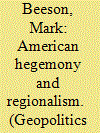

|
|
|
| 3 |
ID:
059836
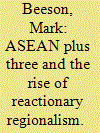

|
|
|
| 4 |
ID:
104344


|
|
|
|
|
| Publication |
2011.
|
| Summary/Abstract |
The intention of this brief introductory essay is to set the scene for the papers in this special collection, by providing some basic background for the subsequent discussion, and by highlighting the key debates that have divided scholars working on Southeast Asia in general and on ASEAN in particular.
|
|
|
|
|
|
|
|
|
|
|
|
|
|
|
|
| 5 |
ID:
159353


|
|
|
|
|
| Summary/Abstract |
Why has East Asia had such a poor record of regional leadership? This is an important question given the fact that East Asia is synonymous with remarkable economic growth and development. At one level, the absence of indigenous leadership might not seem to matter. And yet, when America’s “long-distance” leadership is in apparent decline and China is actively seeking to assert itself, the question of leadership has assumed renewed importance. This paper considered the nature and importance of leadership and explores its impact in case studies of the Asian financial crisis of the late 1990s and the so-called “global financial crisis” of the late 2000s. At this stage, it is unlikely that China will be able to replace America’s leadership role.
|
|
|
|
|
|
|
|
|
|
|
|
|
|
|
|
| 6 |
ID:
167467
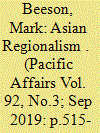

|
|
|
| 7 |
ID:
165155
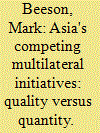

|
|
|
|
|
| Summary/Abstract |
East Asia has many distinctive features that set it apart from other comparable regions, not least attitudes to regional development and cooperation. Despite a growing number of regional initiatives in East Asia, however, they are generally distinguished by their ineffectiveness. It is entirely possible that ‘institutional balancing’, like its more well-known power balancing counterpart, is designed not to facilitate but to prevent something from happening. The sort of ‘multilateralism 1.0’ developed by the Association of Southeast Asian Nations (ASEAN) has a lot to answer for in this regard: having established its own pattern of institutional effectiveness ASEAN's ‘leadership’ has caused it to be replicated under the new wave of ‘multilateralism 2.0’. Consequently, I suggest that not only is China very comfortable with the idea of a rather feeble and ineffective institutional architecture, but the USA is also unlikely to do anything to change this picture, especially under a Trump administration that is highly skeptical about the efficacy of multilateral institutions at the best of times.
|
|
|
|
|
|
|
|
|
|
|
|
|
|
|
|
| 8 |
ID:
077593
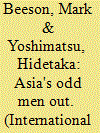

|
|
|
|
|
| Publication |
2007.
|
| Summary/Abstract |
Australia and Japan have frequently had difficult relationships with their neighbours. This paper suggests that when seen in their specific historical contexts, the fact that Australia and Japan have become 'Asia's odd men out' is unsurprising. The central argument of this paper is that the consolidation and institutionalisation of regions is in large part a political exercise that reflects, and is informed by, discrete national conversations. Until and unless such national discourses align with wider transnational developments, regional processes are unlikely to prosper. An examination of Japan's and Australia's respective attempts to engage with and define their region reveals just how problematic this process can be
|
|
|
|
|
|
|
|
|
|
|
|
|
|
|
|
| 9 |
ID:
100723


|
|
|
|
|
| Publication |
2010.
|
| Summary/Abstract |
Does the rise of China present a threat or an opportunity for Southeast Asia? One of the most revealing arenas in which this will be determined will be within the context of regional institution-building. For a region that is perennially associated with under-institutionalisation it is remarkable just how many initiatives have been proposed recently. Such institutions, may be important venues within which 'asymmetric regionalism' may be manifest and perhaps managed. The paper provides an assessment of this process through an analysis of China's relationship with Southeast Asia. The paper initially provides a brief theoretical introduction which explains the relationship between regional development and its possible impact on inter-state relations. Following this I provide an analysis of the political economic and strategic dynamics that are shaping and being shaped by regional initiatives. Finally, I assess how successful ASEAN's efforts have been to engage China via regional mechanisms has actually been.
|
|
|
|
|
|
|
|
|
|
|
|
|
|
|
|
| 10 |
ID:
191562
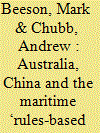

|
|
|
|
|
| Summary/Abstract |
Despite systemic internal and external differences, Australia and China have shown striking similarities in their pursuit of disputed maritime resource and jurisdictional claims. This high-stakes area of international politics is governed by a codified, globally accepted international legal regime (the United Nations Convention on the Law of the Sea), making it an important case for examining the relationship between states’ foreign policies and the ‘rules-based international order’. In the South China Sea, Beijing is haunted by the legacy of its strong geopolitically driven support for an expansive law of the sea regime in the 1970s. Strategic considerations also drove Australia’s belated embrace of international legal processes in the Timor Sea in 2016. Before that, successive Australian governments had been as keen to pursue national maritime interests through bilateral negotiations as their Chinese counterparts. Australia’s shift was enabled by pro-Timor domestic public opinion and a confluence of geographic and commercial circumstances not present in the South China Sea.
|
|
|
|
|
|
|
|
|
|
|
|
|
|
|
|
| 11 |
ID:
131665
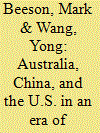

|
|
|
|
|
| Publication |
2014.
|
| Summary/Abstract |
Tensions in the Asia-Pacific region are rising as a consequence of the U.S. "pivot" to Asia and China's increasingly assertive foreign policy. Other states in the region must try to reconcile potentially conflicting economic and strategic imperatives as a consequence. Australia illustrates these dilemmas. We ask what role regional institutions can play.
|
|
|
|
|
|
|
|
|
|
|
|
|
|
|
|
| 12 |
ID:
163077
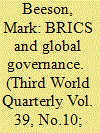

|
|
|
|
|
| Summary/Abstract |
The impact of rising powers generally and the BRICS - Brazil, Russia, India, China and South Africa - in particular on the existing global order has become controversial and contested. Donald Trump’s nationalist foreign policy agenda has raised questions about the BRICS willingness and capacity to provide leadership in place on an American administration that is increasingly inward looking. As a result, the rise of BRICS poses potential normative and structural challenges to the existing liberal international order. Given its geoeconomic significance, China also poses a potential problem for the other BRICS, as well as the governance of the existing order more generally. Consequently, we argue that it will be difficult for the BRICS to maintain a unified position amongst themselves, let alone play a constructive role in preserving the foundations of ‘global governance’.
|
|
|
|
|
|
|
|
|
|
|
|
|
|
|
|
| 13 |
ID:
072500
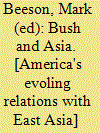

|
|
|
|
|
| Publication |
London, Routledge, 2006.
|
| Description |
xv, 270p.
|
| Standard Number |
0415383331
|
|
|
|
|
|
|
|
|
|
|
|
Copies: C:1/I:0,R:0,Q:0
Circulation
| Accession# | Call# | Current Location | Status | Policy | Location |
| 051379 | 327.7305090511/BEE 051379 | Main | On Shelf | General | |
|
|
|
|
| 14 |
ID:
107232
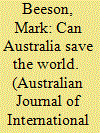

|
|
|
|
|
| Publication |
2011.
|
| Summary/Abstract |
Australian policymakers have always harboured a desire to 'punch above their weight'. On occasions they have succeeded. At a time when Australia's strategic, economic and environmental future is inextricably bound up with that of its immediate neighbours and the wider world, there are compelling reasons for hoping that they still can. This paper explores some of the most important aspects of Australian foreign policy during the Rudd era and asks whether the Australian government can play a constructive-even an exemplary-role in finding solutions for some of the planet's most pressing problems.
|
|
|
|
|
|
|
|
|
|
|
|
|
|
|
|
| 15 |
ID:
121757
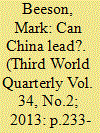

|
|
|
|
|
| Publication |
2013.
|
| Summary/Abstract |
The 'rise of China' is proving to be one of the most consequential developments of the early 21 century One of the key questions it raises is about the impact this historically unprecedented process will have on the East Asian region in particular and the world more generally. Will Chinese policy makers will be able to translate the country's growing material importance into other forms of political power and influence? Equally importantly, will Chinese elites be 'socialised' into the practices and norms of extant institutions, or will they attempt to redefine them to further Chinese foreign policy goals? This paper explores these questions by initially looking at the overall historical context in which East Asian regionalisation has occurred, before considering the operation of some of the more important regional institutions. It is suggested that China's ability to offer regional leadership is constrained both by its own security policies?which are seen as increasingly threatening by many of its neighbours?and by the actions of the USA, which is trying to reassert its own claims to regional leadership. While the outcome of this process is inconclusive, it helps us to understand the more general dynamics reshaping the international system as a result of the emergence of new centres of international power.
|
|
|
|
|
|
|
|
|
|
|
|
|
|
|
|
| 16 |
ID:
147249
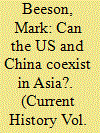

|
|
|
|
|
| Summary/Abstract |
The absence of effective regional institutions means that the geopolitical competition between the United States and China is likely to play out without the constraining influence such organizations can provide
|
|
|
|
|
|
|
|
|
|
|
|
|
|
|
|
| 17 |
ID:
137302


|
|
|
|
|
| Summary/Abstract |
Middle power theory is enjoying a modest renaissance. For all its possible limitations, middle power theory offers a potentially useful framework for thinking about the behavior of, and options open, to key states in the Asia-Pacific such as South Korea, Japan and Australia, states that are secondary rather than primary players. We argue that middle powers have the potential to successfully implement ‘games of skill’, especially at moments of international transition. Frequently, however, middle powers choose not to exercise their potential influence because of extant alliance commitments and the priority accorded to security questions. We substantiate these claims through an examination of the Australian case. Australian policymakers have made much of the potential role middle powers might play, but they have frequently failed to develop an independent foreign policy position because of pre-existing alliance commitments. We suggest that if the ‘middle power moment’ is to amount to more than rhetoric, opportunities must be acted upon.
|
|
|
|
|
|
|
|
|
|
|
|
|
|
|
|
| 18 |
ID:
138094


|
|
|
|
|
| Summary/Abstract |
Middle power theory is enjoying a modest renaissance. For all its possible limitations, middle power theory offers a potentially useful framework for thinking about the behavior of, and options open, to key states in the Asia-Pacific such as South Korea, Japan and Australia, states that are secondary rather than primary players. We argue that middle powers have the potential to successfully implement ‘games of skill’, especially at moments of international transition. Frequently, however, middle powers choose not to exercise their potential influence because of extant alliance commitments and the priority accorded to security questions. We substantiate these claims through an examination of the Australian case. Australian policymakers have made much of the potential role middle powers might play, but they have frequently failed to develop an independent foreign policy position because of pre-existing alliance commitments. We suggest that if the ‘middle power moment’ is to amount to more than rhetoric, opportunities must be acted upon.
|
|
|
|
|
|
|
|
|
|
|
|
|
|
|
|
| 19 |
ID:
110070
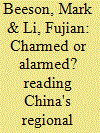

|
|
|
|
|
| Publication |
2012.
|
| Summary/Abstract |
China has rapidly re-emerged as a major regional power in East Asia. Although this represents a return to a long-established historical pattern, the ability of China's political elites to reassure nervous neighbours about the implications of its rise will be a major test of its evolving and increasingly sophisticated foreign policies. In this paper we focus primarily on China's regional engagement strategies, detailing the way such initiatives are understood in China, and the way they are received elsewhere. We focus primarily on the political and economic impacts of China's policies, and briefly consider their reception in Northeast Asia and Southeast Asia. We highlight the different dynamics and issues that China's policymakers must consider in each area, and suggest that despite some difficulties and tensions, on balance, China's policies are proving surprisingly effective.
|
|
|
|
|
|
|
|
|
|
|
|
|
|
|
|
| 20 |
ID:
144323
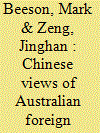

|
|
|
|
|
| Summary/Abstract |
The economic importance and strategic significance of Australia's relationship with China means that bilateral ties have become a major focus of attention in the scholarly and policymaking communities in Australia. Understandably enough perhaps, less attention has been given to the way the relationship is understood in China. This article addresses this absence in the literature by providing an overview of some of the more important contributions to the discussion in China. The most important point that emerges from such an analysis is that there is an ‘asymmetry of interest’ in the two countries, with Australia occupying a far less prominent place in Chinese policy discussions than China does in Australia. Equally noteworthy is the fact that the study of Sino-Australian relations in China is characterised by a greater variety of perspectives than it is in Australia. Appreciating this diversity is an essential part of developing a more accurate understanding of the policymaking milieu in China.
|
|
|
|
|
|
|
|
|
|
|
|
|
|
|
|
|
|
|
|
|